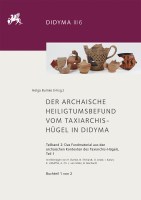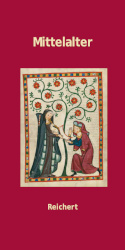Search
Kaiser, Ivonne; Lölhöffel, Karoline; von Miller, Alexandra; Reichardt, Bettina; Jeske, Olivia; Ehrhardt, Norbert
Editor: Bumke, Helga
Der archaische Heiligtumsbefund vom Taxiarchis-Hügel in Didyma
Teilband 2: Das Fundmaterial aus den archaischen Kontexten des Taxiarchis-Hügels, Teil 1
2023
21.0 x 29.7 cm, 1380 p., illustrations color, illustrations b/w, hardback, 2 Bände (Bd 1: 604 S., Bd. 2: 776 S.)
ISBN: 9783752007572
21.0 x 29.7 cm, 1380 p., illustrations color, illustrations b/w, hardback, 2 Bände (Bd 1: 604 S., Bd. 2: 776 S.)
198,00 €
ISBN: 9783752007572
Short Description
The ›Taxiarchis Hill‹ in Didyma is the site of largely undisturbed features of votive offerings and other finds from an Archaic sanctuary. They were deposited on the hill in different phases of the Archaic period. Since it is the first discovery of this kind in Didyma it is of great importance for our knowledge of the cults and dedications in Didyma. This second part of the three-volume publication presents the pottery, which for the first time gives an overview of Didyma's Archaic local and imported clay vessels, including dedications and pottery for ritual use.Description
The ›Taxiarchis Hill‹ in Didyma is located about 200m northwest of the temple of Apollo and is the site of largely undisturbed features with finds from an Archaic sanctuary, most of which are votive offerings. These were deposited in different phases of the Archaic period and are particularly concentrated in a compact burnt layer that can be linked to the destruction by the Persians. The features include numerous high-quality finds of various types and are of great relevance for our knowledge of Archaic dedications in Didyma, since they are the first undisturbed finds of this kind recovered in this sanctuary.This second part of the three-volume publication presents the pottery found during the excavations, which for the first time gives an overview of the spectrum of local and imported Archaic pottery in Didyma. Local types are present in a hitherto unknown richness of variants, which gives our knowledge of Ionian pottery production a new basis. Furthermore, the identification of numerous vessels and special vessel forms as cult pottery allows the reconstruction of ritual practices and provides an important contribution to the archaeology of sanctuaries. This also applies to the numerous vessels that were offered as dedications, since they also include cult-specific types that are not represented in all sanctuaries. These assemblages can provide clues to the identity of the worshipped deity.




 Preface
Preface

 Neuerscheinungen 2023/2024
Neuerscheinungen 2023/2024
 Gesamtverzeichnis 2023/2024
Gesamtverzeichnis 2023/2024
 Katalog Oriental Studies & Linguistics
Katalog Oriental Studies & Linguistics
 Mittelalter
Mittelalter
 Deutsche Inschriften
Deutsche Inschriften
 Musiktherapie
Musiktherapie
 Literaturen im Kontext
Literaturen im Kontext